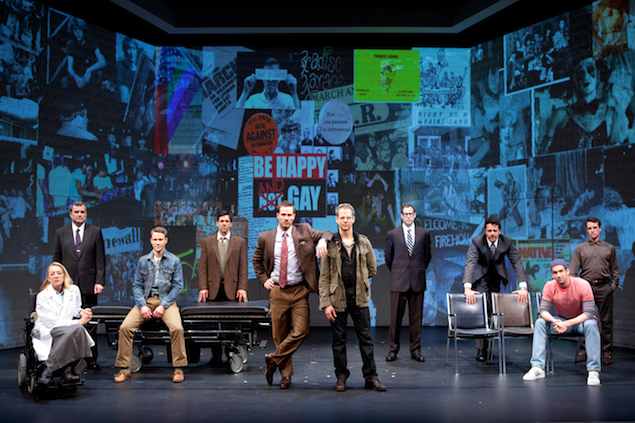
There’s a persistent drumbeat that punctuates
The Normal Heart, currently playing at Arena Stage in a stellar production directed by
George C. Wolfe. Between scenes, loud,
aggressive bursts of music accompany flashes of names, facts, and
figures projected onto the stage.
The frantic pace with which the actors move from scene to scene
helps communicate the uncomfortable fact that things are hurtling
towards an apocalypse of sorts, and an almost inevitable
conclusion.
In
Larry Kramer’s play—which debuted in 1985 at New York’s Public Theater and won a Tony for its Wolfe-directed revival on Broadway last
year—a strange disease is afflicting some friends of writer Ned Weeks (Patrick Breen), revealed in shocking visual detail when Weeks runs into David (Chris Dinolfo) at a doctor’s office, only to find the right side of his face covered in large red sores. At the beginning of the show,
41 gay men in New York have died of the same disease, which Dr. Emma Brookner (Patricia Wettig) believes is some kind of a
virus. As the play proceeds, the metaphorical drumbeat gets louder;
Weeks’s sense of rage and
frustration at the apathy around him gets fiercer, and the
bodies start to pile up, demonstrated visually by the ever-growing
list of names we see in stark white letters.
A Normal Heart is as much a timeline as anything
else—its structure is chronological, set between 1981 and 1984—meaning
time, or the lack
of it, is one of the most vividly felt aspects of the
production. The character of Weeks, a thinly veiled version of Kramer
himself, constantly recites numbers, facts, and figures,
underpinning the urgency of what is literally a life-or-death situation.
Breen, who strikes the right balance between endearingly
neurotic and furiously obsessive, at times seems like a man possessed,
screaming one minute and dumbly calm the next. His community of
gay friends doesn’t want to hear that promiscuity might be
threatening their lives, while the medical, political, and
journalistic institutions in New York and Washington respond with
abject homophobia, refusing to even acknowledge the crisis.
Weeks’s one ally is Emma, a dryly funny harbinger of
doom whom Wettig presents as a no-nonsense battle-ax, as unequivocal
as she is apparently dispassionate. Wheelchair-bound by an
attack of polio, Wettig’s character faces the problem head on,
maintaining an even tone as she bluntly urges Weeks to tell the
gay community to stop having sex (which as Weeks’s friends
tell him, is about the only tenet of gay ideology they’ve
managed to agree on).
The cast differs slightly from the show’s Broadway incarnation, but the ensemble is so tight, it’s hard to imagine a better
production. As Weeks’ lover and first real love, Felix,
Luke McFarlane returns to offer one of the most moving performances, breaking through the irascible activist’s self-loathing only to have
tragedy strike. The show’s second act is an incessant collage of raw, powerful scenes, from Mickey Marcus’s (Michael Berresse) helpless rage to Bruce Niles’s (Nick Mennell) quiet acceptance of the
awfulness of the epidemic around him. Wolfe allows each actor to shine,
especially Wettig in an outburst
of pure, ferocious rage, and although the barrage of
frustration and tragedy makes for tough viewing, it’s unbelievably
powerful
theater.
David Rockwell’s set is one of the most
striking elements of the show: three white walls inscribed with barely
legible newsprint in relief,
with certain words occasionally highlighted. It’s a reminder of
the confusion, the lack of foresight, and the utter helplessness
the advent of AIDS presented. The props and furniture the
characters use to convey different locations are minimal and effective.
In some scenes, Wolfe brings onstage characters not present in
scenes and positions them around the action, making them a
ghostly shadow on the sidelines.
As he did during the Broadway production, Kramer
offers audience members a letter on their way out of the theater.
“Please
know that AIDS is a plague,” he writes. “Please know that no
country in the world, including this one, has ever called it
a plague, or acknowledged it as a plague, or dealt with it as a
plague.” In a city where AIDS is more prevalent than in most
African countries, Kramer’s message is stark, but even without
the letter, his play is a passionate, urgent call to arms that
still refuses to be silenced. This production, blistering and
heartbreaking as it is, does his message justice.
A Normal Heart
is at Arena Stage through July 29. Tickets ($40 and up) are available via Arena’s website.


















